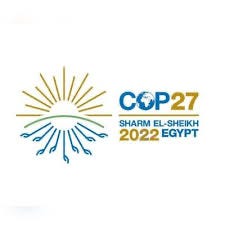If you're really going to hold #COP27 in Egypt...
Then you'd really better #FreeAlaa just to start
The COP27 global climate change conference is set to begin in Sharm el-Sheikh in just over a week. Holding it in Egypt was always a controversial choice, given the Sisi’ regime’s extreme repression and abysmal human rights record (next year, the COP28 goes to the UAE, so clearly human rights and democracy are not priorities for the organizers of global climate change conferences). It would be an absolute tragedy if world leaders, environmental scientists, and civil society groups converged in Egypt if Alaa Abd al-Fattah — and thousands of other political prisoners — remain in prison.
Here’s to hoping that his hunger strike, acquisition of UK citizenship, and the determined advocacy campaign for his release finally makes Sisi decide to release Alaa. There are no other obvious forcing mechanisms on the horizon, no other opportunity for a global spotlight which might raise the reputational costs for his utterly unjust imprisonment. If Qatar decides to step in to support Egypt economically, it’s unfortunately unlikely Alaa’s release would be high on its wish list. I suspect that Sisi revels in Alaa’s torment, sees his ongoing imprisonment as a lesson to all other would-be dissidents, and likes to demonstrate his obstinate refusal to give in to external pressure. Such as it is. Biden has shown no interest in raising human rights issues anywhere in the Middle East and passed through Egypt recently without a whisper of normative pressure: the White House readout of that meeting actually referenced “mutual commitment to a constructive dialogue on human rights” with a straight face. There’s still time to do the right thing.
The COP27 meeting is going to happen either way. It’s actually great that it’s held in the Middle East: the scope and scale of climate change impacts on the region are vast, from the escalating temperatures across the Gulf and the rest of the region to water depletion and so much more. I just wish either it wasn’t in such a brutally repressive state, or that international actors would actually use the global spotlight to push for human rights reforms.
To talk through the implications of holding it in Egypt from an environmental perspective, I invited the great Jeannie Sowers onto my podcast. Sowers is the author of Environmental Politics in Egypt, recently edited a forthcoming handbook on environmental politics, and collaborated with me earlier this year on a POMEPS STUDIES volume on environmental politics in the Middle East.
Sowers notes that Egyptian activists and civil society after the 2011 revolution manifested a great deal of interest in environmental issues. While Egypt isn’t a great driver of climate change, it certainly feels its effects through rising temperatures, food insecurity, spreading infectious disease, changing agricultural productivity and more. As those pressures escalate, societal resilience recedes in the face of economic crisis, poverty, crumbling infrastructure, and state indifference. But state mitigation and adaptation efforts are marred by the same overcentralization, cronyism, and preferential economic access to the military — all of which are symptoms of a repressive, antidemocratic regime designed to protect those inequities. They also tend to reflect Gulf trends towards expensive technological solutionism and flashy showcase projects that often don’t address the lived experience and direct, urgent needs of a vast, poor urban population. Sowers has a lot to say about all this, and I’d urge you to listen to her short segment for more fascinating insights.
In the meantime, #FreeAlaa already.




